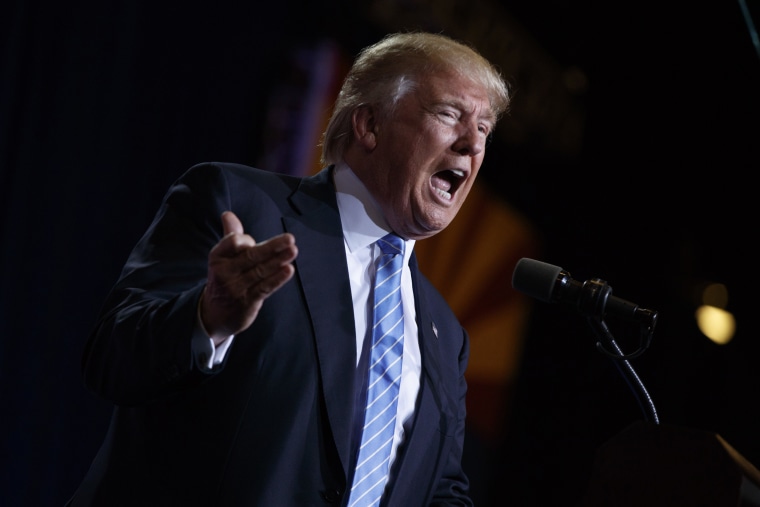DETROIT— For weeks Donald Trump has offered a peculiar invitation to black voters.
“You’re living in poverty, your schools are no good, you have no jobs, 58 percent of your youth is unemployed,” Trump said during a recent rally in Dimondale, Michigan in front of an overwhelmingly white audience. “What the hell do you have to lose?”
He’s echoed similar sentiments before similar crowds in other cities to loud applause and enthusiasm.
While many in his base may have been high-fiving over Trump’s efforts to address social issues that many African-Americans face, the tone, broad generalizations and statistical bloating used by candidate Trump has had the opposite effect with blacks.
Over the last couple days Trump has taken his outreach efforts on the road. On Friday he met with community leaders in Philadelphia. On Saturday morning he’ll visit a black church in Detroit.
Related: Trump Gets Zero Percent Support From Black Voters in Ohio
But his trip has been mired in skepticism and controversy since it was announced last week, when the campaign and the church’s pastor confirmed that the event was closed to the press, that Trump would not directly address congregants and that Bishop Wayne T. Jackson would conduct a closed-door interview with Trump that would air for at least a week later on the streaming television network founded by Jackson. Then on Thursday night the New York Times published a leaked list of scripted answers Trump was to give in response to Jackson’s pre-approved questions.
Hours later the Trump campaign reversed course and said that the candidate would address the audience at Jackson’s Great Faith Ministries International church for about 10 or 15 minutes.
The prospect of Trump coming to Detroit, perhaps the blackest big city in America, in an effort to reach black voters without actually engaging any black voters confounded some and angered others. Black voters in Detroit have been paying close attention to Trump’s rhetoric and his missteps during his efforts to court them.
“I'm not even sure that I would say he reached out to black folks. I think that, when you address somebody, you have to talk from their cultural perspective. I think Mr. Trump has insulted not only blacks, but everybody else,” said Alando Reeves, a political consultant. “I don't see it as a way of engaging black folks to have an in between if you havin' a conversation in a black community. I don't need somebody to speak for me. So if you want to hear my opinion, then ask me.”
“I don't see him talking about, 'Well, this is what I plan to do for African-Americans,' " said Eric Fowlkes, a recent college graduate. “I just see a bunch of him trying to get get brownie points for making comments about African-Americans. And I think it's very disrespectful.”
Polling across the country shows little-to-no African-American support for Donald Trump. Michigan is no different. Recent data shows that 88 percent of black voters say they’ll choose Democrat Hillary Clinton compared to just 8 percent for Trump.
Related: Trump Speech Failed to Sell 'Law and Order' to Blacks
Nationally, those numbers skew even further in support for Clinton. An NBC/Wall Street Journal poll taken between July 31 and August 3 shows black support at 91 percent for Clinton and just 1 percent for Trump.
Some have speculated that Trump’s latest overture to black voters is not aimed at blacks per se, but at white college educated voters. While Trump holds a sizable lead over Clinton with uneducated white voters, Clinton holds a 47 percent to 40 percent lead with white, college-educated voters — a historically reliable Republican demographic. The theory goes that many educated white voters, who tend to be less socially conservative than their less-educated counterparts, may be turned off by the perception that Trump’s rhetoric on a number of issues appears racist or bigoted, etc. By showing that he’s reaching out to blacks, Trump may be trying to make some white voters more comfortable with him.
Wayne Bradley, a black Republican who heads Michigan’s African-American outreach, said that while support for Trump among black voters is slim, it’s only because they haven’t had a chance to properly engage with him. They simply haven’t heard enough about Trump's plan to fix what ails them, he said.
Related: Trump to African-American Voters: What Do You Have to Lose?
“I think that if he continues to have a dialogue, going to different places throughout the country, in these urban areas like Detroit, like a Cleveland, like a Chicago, and he's willing to have the conversation in those communities, I think that people are looking for a reason to vote for Donald Trump,” Bradley said. “There's a lot of people that don't trust Hillary Clinton in our community. What I'm hearing more of is people are saying, ‘I wanna hear his policy. His ideas. Give me a reason for vote for him.’”
Still, black voters like Tahjma Vaughn say they're not buying Trump’s latest efforts to woo them.
“I think he's trying to play on his insecurities. And that's my problem. You're basically telling us we're helpless without you,” Vaughn said. “But we've been hearing that. We've always been hearing that we need some white savior to come save us, when we're capable of doing that ourselves. Why can't you acknowledge that?”

